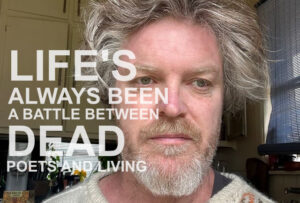Nell Prince reviews Angola, America by Sammy Weaver (Seren, 2022)
For readers willing to go a little out of their comfort zone, Angola, America is an interesting pamphlet. These are poems which fiercely interrogate the death penalty and the American prison system – not subjects for the faint of heart.
A little background: bounded on three sides by the Mississippi river, Angola is the largest American maximum-security prison. Located in Louisiana, it takes its name from a former slave plantation as Angola was the name of the homeland of slaves. It has a particularly dark and depressing history and was once known as ‘the bloodiest prison in the south’. There is a museum which documents this history, and we find poems that talk about the ‘curios of felony’ in Sammy Weaver’s pamphlet.
Weaver questions the viewing of these items and our tendency to “itemise / persons into items”. She also finds a disturbing connection in the word ‘museum’: she notes that ‘muse’ is inside museum’ and later that the Latin museum means ‘muzzle’ and there are muzzle-like items on display:
a mouth-shaped trap of straps & wires
made to restrain biting & raptures
Following on from ‘[ angola / museum ]’, there are poems about the exhibits which form part of the museum tour. Two are about the electric chair – one of these is a description of a wooden ‘Gruesome Gertie’ who is:
[…] sitting there in the museum
like a chair sits unassumingly except
she is rigged with leather at the legs
& wrists. Which southern tree was she?
It’s a powerful image and one which has stayed with me as I’ve been reading over these poems. I like the fact Weaver has picked up on this oddness of a fake corpse – it is faintly amusing – and then wonders what kind of southern tree provided it. I’m reminded, too, of how asking questions can indicate almost childlike curiosity – it introduces a note of innocence, which is surprising given the subject matter (death penalty).
How far are the conditions in maximum-security prisons conducive to rehabilitation? Going by Weaver’s pamphlet, not very
Another poem ‘[death row hex]’ further investigates the subject of execution, but it is written in a more incantatory, dream-like style. Here is the beginning:
- let the lords of big pharma
- dam up the rivers of paralytic
- & potassium
- so the glass vials become
- trinkets of air
- let the nib of the needle
- blunt into a stub
- & scud across the surface
The poem gets to the desperation of someone who is condemned to die either by lethal injection or the electric chair. It feels a little like a protest poem, too, with its mention of ‘big pharma’. The fact that it doesn’t get into the specifics of who is being executed makes the poem all the more powerful, and this technique is echoed elsewhere in the pamphlet. In ‘[brood x]’, for example, an unnamed inmate’s cell roof is full of insects:
The sky above his cell is full of cicadas.
Risen from their seventeen-year bunkers.
Resurrected from the darkness where they sucked
the tree-root syrup, growing into fat larvae.
It is a beautiful poem with resonant imagery, which – again – grapples with the nightmare of incarceration in America, detailing horrifying conditions of insects in cells. I’m left wondering who ‘he’ is? A serial rapist? Mass murderer? Thief? The poems in Angola, America lead to more questions. Should there be a death penalty? How far are the conditions in maximum-security prisons conducive to rehabilitation? Going by Weaver’s pamphlet, not very.
There’s a dizzying poetry at work here
One of the poems I enjoyed the most was ‘[escapism]’ – perhaps this is because I’m rewatching Prison Break (an American TV series about a man wrongly sentenced to the death penalty), but it gets to the very core of the imprisoned mind which must constantly loop on themes of freedom:
is what matters the matterless
space between the bars? – a freeway
for motes to drift back & forth –
the moon enters – unfolding her orb
‘unfolding her orb’ has a Romantic quality about it – it’s that word ‘orb’ – reminding me of Milton, too – that does it, because it’s surprising in such a non-Romantic pamphlet. ‘unfolding her orb’ suggests, too, the angular shapes of the cells, particularly the barred windows. It’s a stellar description! Later in the poem:
a pipistrelle echolocating the holes
in the steel dips & dives from cell to cell –
most of all – quarks – those subatomic
particles whizzing through the solid walls
There’s a dizzying poetry at work here. Fiona Benson mentions Weaver’s ‘musical skills’ on the back cover. Certainly in this poem there is a music in the way that Weaver zooms in on the natural elements which a dreaming mind might latch onto when imprisoned.
Overall, this feels like an important tackling of a subject which doesn’t get much air time in the contemporary poetry scene. The cynic in me wonders for a moment if that is why the poet has chosen the subject, but that’s unfair: these poems have heart. The pamphlet genuinely engages with serious issues and does so with a musical touch.
Nell Prince has been published in New Poetries VIII, PN Review, Wild Court, and Perverse, and has work forthcoming with Anthropocene. In 2016 she was runner-up in the Jane Martin prize.

